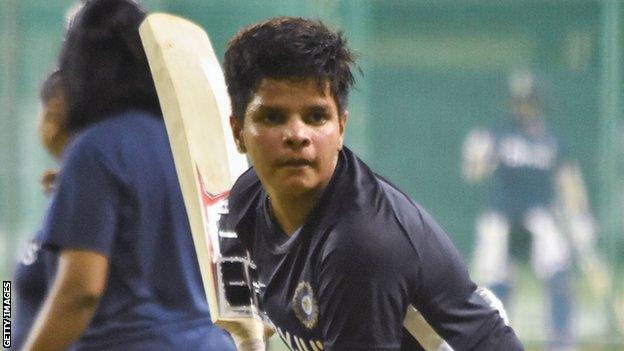Shafali Verma's journey to breaking Sachin Tendulkar's record
- Published

Shafali Verma was named player of the series in her debut series against West Indies
When Shafali Verma was nine years old, she sat on her dad's shoulders and cheered on her hero Sachin Tendulkar in his final Ranji Trophy match.
Six years later, aged 15 years and 285 days, she broke the legendary Tendulkar's record to become the youngest Indian player to score an international fifty.
What happened in between is a story of determination and triumph against the odds in a region where girls are often discouraged from playing sport.
Inspired by Tendulkar's visit to her local stadium in Rohtak near Delhi in 2013, Verma took up cricket, only to be turned away from her local academy because she was not a boy.
Disheartened but not defeated, Verma's father had an idea. He had his daughter's hair cut short to trick people into thinking she was a boy.
"Where I'm from there are some things girls shouldn't do, but my family always supported me," Verma told Stumped on BBC World Service.
"After cutting my hair, I would train with the boys and that's really helped me play the way I play today."
Just one day after breaking Tendulkar's record with 73 runs off 49 balls in a Twenty20 international against West Indies in St Lucia, Verma repeated the feat with an unbeaten 69 off 35 balls against the same opponents.
She plundered 22 boundaries across the two innings, displaying a raw power that was honed in an innovative childhood workout.
"Close to where I live there is a place where the police force used to have training drills," she explains. "There were tyres there and I used to train lifting and flipping those tyres. That really helped me get stronger."
Verma's power hitting for Haryana Women earned her a call-up to Mithali Raj's Velocity team in the Women's T20 Challenge played alongside the Indian Premier League in May.
And it was Raj's retirement from international T20 cricket that created space for Verma's call-up to the full India squad in September.
Now, as she looks ahead to the Twenty20 World Cup in Australia in February and March, Verma is hoping her story will encourage more parents from her country to encourage their daughters to play sport.
"What I would say to every family is don't think girls shouldn't leave the house," she adds. "You have to support them. It's not that girls will only do well in studies. They can also do really well in sports.
"What I want is that if there is a young girl, she shouldn't be stopped from playing cricket. If she works hard and focuses on her game anything can happen."